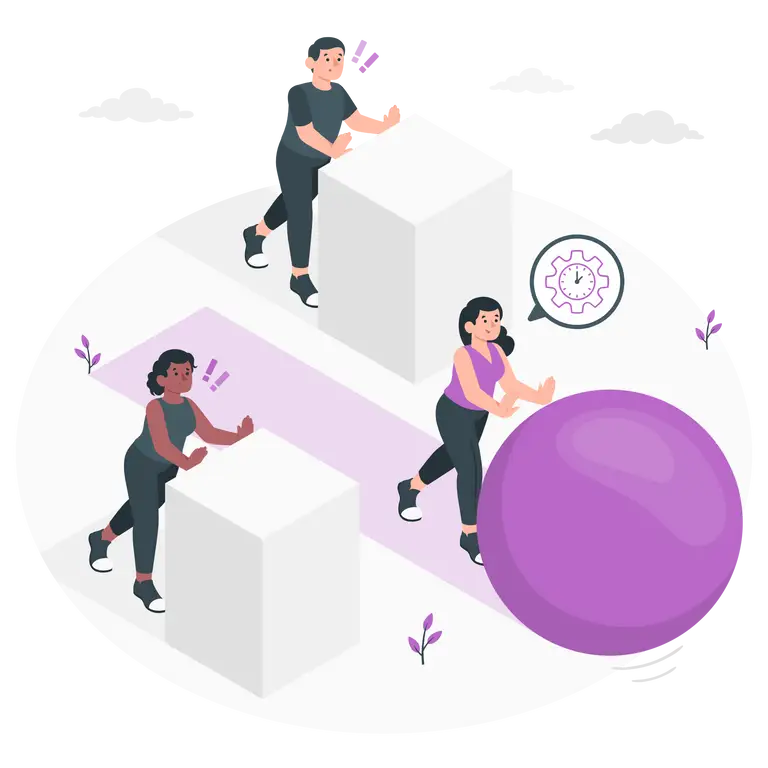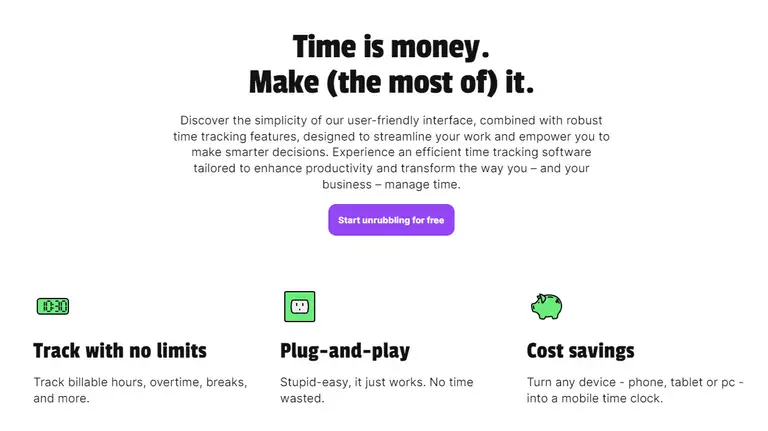Efficacy versus efficiency… Have you ever wondered what the difference is between these terms?
Today we will explore these two powerhouses of productivity.
By the end of this post, you'll have a clear understanding of how these concepts differ and how they can impact your work.
What is Efficacy?
Efficacy refers to the ability or effectiveness of something to produce the desired results or outcomes. It’s a measure of how well a particular method, treatment, or intervention achieves its intended purpose.

Efficacy Examples in The Workplace
Efficacy can be seen in various industries and in multiple different formats.
Manufacturing Industry
- Finding ways to make things faster and with less waste, like using better processes and machines.
- Checking the quality of products regularly to make sure they're good.
- Using technology to automate tasks and reduce mistakes.
- Teaching employees new skills so they can work better.
Health Care Industry
- Using computers to keep patient records organized and accurate, which helps doctors make better decisions.
- Checking how well doctors and hospitals are doing to make sure patients get good care.
- Using technology to provide medical help from a distance (telemedicine), so people can see a doctor without going to a hospital.
- Following guidelines and best practices to make sure patients are treated well and mistakes are avoided.
Information Technology Industry
- Using teamwork and flexible planning to make software projects more efficient and productive.
- Using Internet services to make computer systems more flexible and cost-effective.
- Checking computer code and running tests to fix any problems and make sure the software works well.
- Using tools to track how well computer systems are working and make improvements.
Retail Industry
- Keeping track of customer information to provide better service and make customers happier.
- Using systems to manage inventory so stores have enough products and don't waste money on having too much stock.
- Looking at data to understand what customers want and making sure stores have the right products at the right time.
- Making the checkout process faster and easier with modern technology and various payment processors.
These examples perfectly show how businesses can improve their work by using strategies and techniques to work better and get better results.
What is Efficiency?
Efficiency refers to the ability to accomplish a task or achieve a goal with minimal waste of time, effort, or resources. It’s an indicator of how well resources are used to produce the desired output. Efficiency’s often associated with maximizing productivity and reducing inefficiencies or unneeded steps in a process.

Efficiency Examples in The Workplace
Efficiency in the workplace is all about accomplishing tasks and goals with minimal wasted effort, time, or resources.
Here’s how it can be done in 4 distinct industries:
Manufacturing Industry
- Organizing workspaces and materials to minimize time wasted searching for tools or supplies.
- Streamlining production processes to reduce unnecessary steps and production time.
- Implementing lean manufacturing techniques to optimize workflow and eliminate bottlenecks.
- Training employees on efficient work practices to increase productivity and reduce errors.
Health Care Industry
- Implementing electronic medical records systems to reduce paperwork and improve access to patient information.
- Optimizing appointment scheduling systems to minimize patient wait times and maximize the use of healthcare resources.
- Standardizing workflows and procedures to increase efficiency in patient care delivery.
- Utilizing telemedicine and remote monitoring technologies to provide healthcare services more efficiently.
Information Technology Industry
- Automating repetitive tasks through scripting or coding to save time and improve accuracy.
- Implementing project management tools to track progress, assign tasks, and optimize project timelines.
- Improving code quality through code reviews and testing processes to minimize bugs and reduce rework.
- Optimizing server and network configurations to ensure fast and reliable data transfer and system performance.
Retail Industry
- Using point-of-sale (POS) systems to streamline the checkout process and reduce transaction time.
- Implementing inventory management systems to optimize stock levels and minimize overstock or out-of-stock situations.
- Utilizing data analytics to identify customer preferences and optimize product assortments.
- Training employees on efficient customer service practices to reduce waiting times and enhance customer satisfaction.
These examples are a good representation of how efficiency can be achieved in diverse industries. Ultimately, it’s all about implementing strategies and technologies that focus on reducing waste, optimizing processes, and maximizing productivity.
Efficiency vs Efficacy
See how similar (and, at the same time, different) these 2 processes are.
Differences
Efficiency
- focuses on accomplishing tasks quickly and effectively
- emphasizes resource optimization and productivity
- measurement of outcomes in terms of time, cost savings, or resource utilization
Efficacy
- focuses on producing desired results or outcomes
- emphasizes the effectiveness and impact of actions
- measurement of outcomes based on the achievement of desired goals
Similarities
- Both are focused on achieving specific goals or desired outcomes.
- Both contribute to overall productivity and performance improvement.
- Both encourage a mindset of optimizing processes, resources, and efforts to maximize effectiveness and productivity.
- Both have a direct impact on the outcomes and the success of projects, tasks, or operations.
- Both promote the idea of continuous improvement by identifying areas for enhancement and finding ways to optimize performance.
- Both consider the effective utilization of resources, whether it's time, money, materials, or human capital.
- Both play a role in informed decision-making processes by guiding choices that lead to better outcomes and resource allocation.
What's Better, Being Effective or Efficient?
Deciding whether effectiveness or efficiency takes the cake depends on the ideal circumstances and goals in play.
When it comes to effectiveness, it's all about nailing the desired outcomes and delivering results that hit the mark. We want to focus on the tasks that really matter, ensuring we achieve our goals with a bang.
Efficiency, on the other hand, steps in when we want to make the most of our (sometimes) limited resources, cut down on waste, and zip through tasks. It's about working smarter, boosting productivity, and ditching any unnecessary fluff.
Are you looking to boost your or your employees’ efficiency? Try Unrubble - the ultimate work schedule maker and time tracking solution.
Our all-in-one tool offers features like employee work time tracking, simplified scheduling, online leave management, and business travel management.
With Unrubble, you can save time, money, and effort while ensuring your team is more effective and your company is more efficient.
Join over 150,000 happy users worldwide. Sign up for free now and experience the difference.

Striking a balance between effectiveness and efficiency is the sweet spot. We aim to be both top-notch performers and productivity champs, delivering the best results possible.
Remember, it's imperative to judge each situation's unique needs. This way you can determine whether effectiveness or efficiency should take the lead.
Ultimately, it's not a question of one being superior to the other; it's about finding the right groove that suits the context and drives success.
Over to You
Understanding the difference between efficacy and efficiency can greatly impact your work.
While efficacy focuses on achieving desired results, efficiency aims to optimize resources and streamline processes.
Striking the right balance between the two is key to success.
If you're looking to boost your efficiency, try Unrubble, the ultimate work schedule maker and time tracking solution.
Sign up for free now and experience the difference in maximizing productivity and achieving your goals.
FAQ
What is efficacy?
Efficacy is the ability to produce desired results or achieve goals effectively and successfully. It focuses on the outcome and impact of actions.
What is efficiency?
Efficiency is the ability to accomplish tasks with minimum waste, effort, or resources. It emphasizes productivity and optimizing processes to achieve desired outcomes quickly.
How do efficacy and efficiency differ?
Efficacy and efficiency differ in their focus. Efficacy emphasizes achieving desired results, while efficiency emphasizes maximizing productivity and minimizing waste.
How are efficiency and efficacy similar?
Both efficiency and efficacy are concerned with achieving desired outcomes. They both contribute to overall effectiveness in different ways.
Is it better to aim for efficiency or efficacy at work?
Whether it's better to aim for efficiency or efficacy at work depends on the context and goals. In some situations, effectiveness may be more important, while in others, efficiency may take priority. It's about finding the right balance.
Are there any tools for boosting efficiency at work?
Yes, there are tools available to boost efficiency at work. Examples include project management software, task management apps, time tracking tools (e.g. Unrubble), and automation software. These tools can streamline processes, improve productivity, and enhance efficiency in various work tasks.





